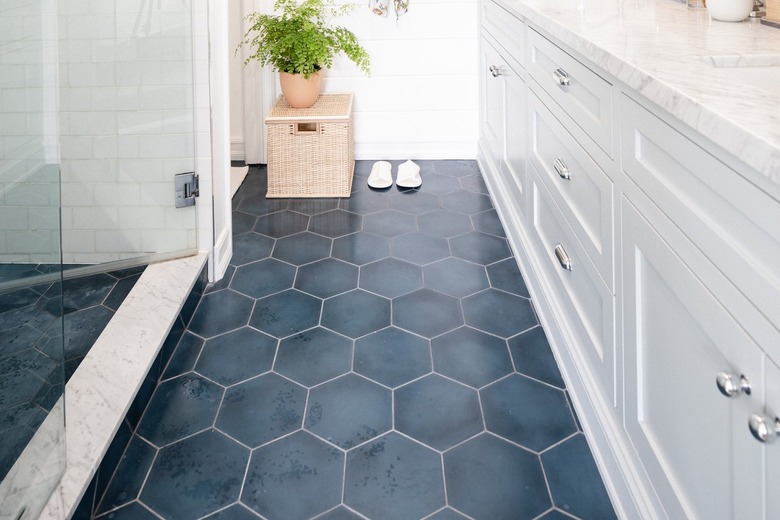Can Porcelain Tiles Withstand Heat?
We may receive a commission on purchases made from links.
Porcelain is widely used in many homes. In addition to serving as an ideal material for bathtubs, sinks and toilets, porcelain is commonly found in flooring and countertops. If you're renovating and would like to use a durable, long-lasting material, porcelain tiles are an ideal choice as they stand up to high heat and other types of wear and tear.
Tip
Porcelain tiles are fired at high temperatures and are more durable than ceramic tiles. They are heat-resistant and fine to use around stoves and fireplaces.
Characteristics of Porcelain Tiles
Characteristics
of Porcelain Tiles
A type of ceramic tile, porcelain tiles are made of fine, dense, white clay, sand and feldspar. These tiles are fired at extremely high temperatures, which creates very low water content in the tiles. This results in tiles that are less porous, denser and harder than other types of tiles. The high-firing process the tiles undergo leads to especially durable products.
The density of the clay and the high-firing process used to make porcelain tiles results in a product that's harder than granite. According to the Tile Council of North America (TCNA), porcelain is impervious. In addition to being scratch and stain resistant, porcelain tile stands up to high heat.
Porcelain Tile Uses
Porcelain
Tile Uses
Porcelain tiles can be used just about anywhere in the home, indoors and out. For instance, porcelain tiles are commonly used for flooring, showers, bathroom walls and countertops. Outdoors, porcelain tiles are often used for outdoor kitchen countertops.
Because porcelain tiles withstand heat, they're popular for stove and sink backsplashes. The high heat created by cooking generally doesn't bother porcelain tiles. Due to its hardness and density, porcelain tile does well as a flooring material in high traffic areas, such as kitchens, bathrooms, hallways and living areas.
You can find porcelain tile options at Home Depot, Walmart, Wayfair and even Amazon.
Porcelain Tiles For Fireplaces
Porcelain
Tiles For Fireplaces
Due to their indestructibility and the fact that they're created at high heat, porcelain tiles are an ideal choice for around and in fireplaces. Porcelain tiles are somewhat like the fire-resistant bricks that absorb heat and are commonly used in fireplaces. Though porcelain tiles are durable around heat, it's best not to have heat in direct contact with them. Create some sort of a barrier or buffer between the tiles and the heat from the fireplace, if possible, to ensure that the porcelain tiles stay looking their best.
On the other end of the spectrum, porcelain tile is highly resistant to cold and freezing temperatures. The material is less likely to crack from cold than other materials, such as ceramic.
Porcelain Tiles vs Ceramic Tiles
Porcelain
Tiles vs Ceramic Tiles
At first glance, porcelain tile resembles ceramic tile. Both types of tiles offer a wide range of design and color options. Ceramic and porcelain tiles are also both clay-based and fired in a kiln.
Porcelain is a type of ceramic. The clays used to make porcelain tile consist of a higher density, and they're fired longer at a higher temperature than ceramic. This process results in porcelain tiles being more durable and heat-resistant than ceramic tiles.
Overall, porcelain tiles hold up to wear and tear much better than ceramic. Porcelain tiles are strong and resistant to cracking and fading. They also resist moisture damage.
Porcelain Tile Drawbacks
Porcelain
Tile Drawbacks
If porcelain tiles are chipped, the clay underneath will show. Chipping will also make the tiles less resistant to heat and may lead to further chipping.
Because of their durability and hardness, installing porcelain tiles is a slightly more DIY project than installing ceramic tiles, primarily because porcelain tiles are a little harder to cut. For that reason, professional installation might be warranted. If porcelain tiles are damaged, they're also more difficult to repair.
